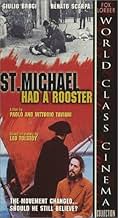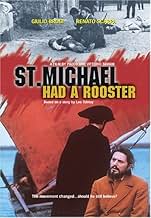CALIFICACIÓN DE IMDb
7.2/10
958
TU CALIFICACIÓN
Agrega una trama en tu idiomaSentenced to life imprisonment for illegal activities, Italian International member Giulio Manieri holds on to his political ideals while struggling against madness in the loneliness of his ... Leer todoSentenced to life imprisonment for illegal activities, Italian International member Giulio Manieri holds on to his political ideals while struggling against madness in the loneliness of his prison cell.Sentenced to life imprisonment for illegal activities, Italian International member Giulio Manieri holds on to his political ideals while struggling against madness in the loneliness of his prison cell.
- Dirección
- Guionistas
- Elenco
- Premios
- 1 premio ganado y 3 nominaciones en total
- Dirección
- Guionistas
- Todo el elenco y el equipo
- Producción, taquilla y más en IMDbPro
Opiniones destacadas
What starts as a light-hearted story, as our hero makes a ludicrous attempt to ignite a revolution, quickly turns into a tragic tale of a basically nice guy who tries to preserve his ideals in inhumane conditions. Although the script is an adaptation of a Tolstoy's short story, it looks more like something Kafka would have written if he had had more sympathy for his characters. The film reminds me of a 19th century caricature by Honore Daumier: a kid breathes on the windowpane of a shop, is caught by a guard, brought to trial, spends his entire life in jail, is released an old man, comes to the same windowpane and defiantly breathes on it, another guard arrives, but the man is already dead. The most beautiful scenes can be found at the end of the film, where the splendid and barren landscape of Venetian marshes is used as the adequate setting for the almost unbearably poignant finale.
An idealistic member of the 'Italian International' called Giulio Manieri tries to encourage uprisings in areas of rural Italy in the late 19th century. Giving himself up so he can promote his cause in court, he is sentenced to death, which is then commuted to life imprisonment. Serving 10 years in solitary confinement - presumably to prevent him from influencing others - he tries to keep madness at bay by a daily routine and talking to himself, using a variety of mental techniques. Released in 1972 writer/directors Paolo and Vittorio Taviani's film is a period drams 'liberally inspired' by the Leo Tolstoy novella 'The Divine and the Human'. It is also a symbolic, existential dry comedy, and psychological examination of revolutionary passions thwarted, with Giulio locked in a cupboard as a child, for being rebellious, and now finding himself locked up in gaol as an adult, for being rebellious. An ironical tale - Giulio even conducts an imaginary trial of himself and his motivations whilst in gaol - it was photographed by Mario Masini.
One of the Taviani brothers' less widespread works, a free adaptation of Lev Tolstoy's tale «Divine and Human», this film runs rather smoothly for 90 minutes, considering the leading character's frequent spells of verbose rhetoric, a 19th century Italian anarchist who fancies a new social order with a handful of followers, and the difficult section that describes his stay in prison during ten years in a solitary cell. The project mostly lies on the shoulders of actor Giulio Brogi, who gives a consistent portrait as Giulio Manieri, an idealist almost gone crazy, a man raised in a rich milieu who turned his back to the "good life", became an ice-cream vendor and fought with and for the peasants of his region, in line with many international struggles for justice and reforms that marked the second half of the 19th century. But the Tavianis also know how to handle their stories and keep us interested, especially in the already mentioned enclosed sequence in prison through sounds and visual metaphors. Their "mise-en-scène" is economical, they avoid visual flourishes, but I could not help noticing the grace of their soft camera movements, or the way they transmitted the sense of sudden, fleeting freedom when Manieri leaves his cell and begins the travel to a new prison. The camera, installed on a boat, suddenly leaves the action behind and makes a long and beautiful travelling of open space, all sky and sea. During this last act of the film, Manieri dismayingly learns from young revolutionaries how the world changed and his actions were forgotten, to the point of considering his generation guilty of the delayed emergence of the labor movement by ten years. In these days of forgotten ideals and desecrated human rights, when political patriarchs die and dubious leaders take power, this is a most timely motion picture.
¿Sabías que…?
- ConexionesReferenced in Bianca (1984)
Selecciones populares
Inicia sesión para calificar y agrega a la lista de videos para obtener recomendaciones personalizadas
Detalles
- Tiempo de ejecución1 hora 30 minutos
- Mezcla de sonido
- Relación de aspecto
- 1.37 : 1
Contribuir a esta página
Sugiere una edición o agrega el contenido que falta

Principales brechas de datos
By what name was San Miguel tenía un gallo (1972) officially released in Canada in English?
Responda



















